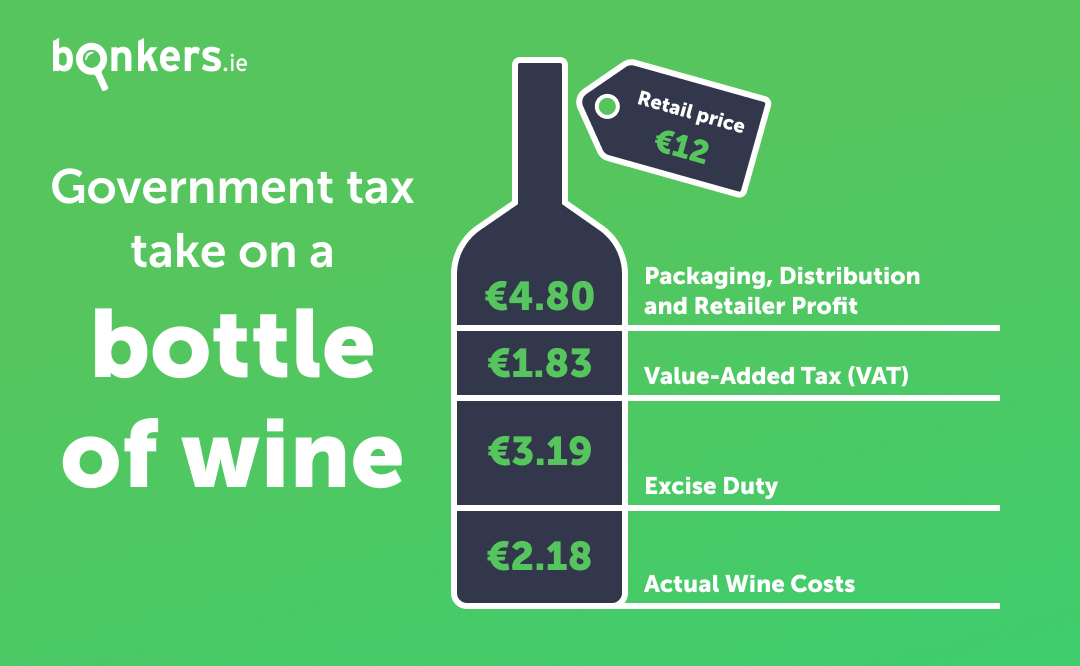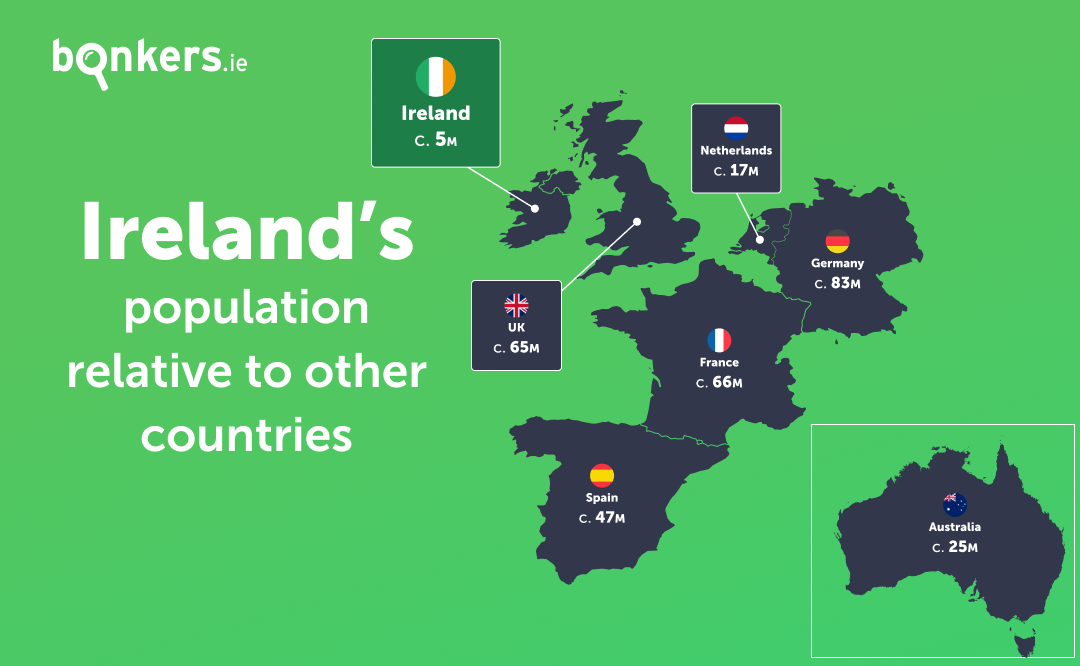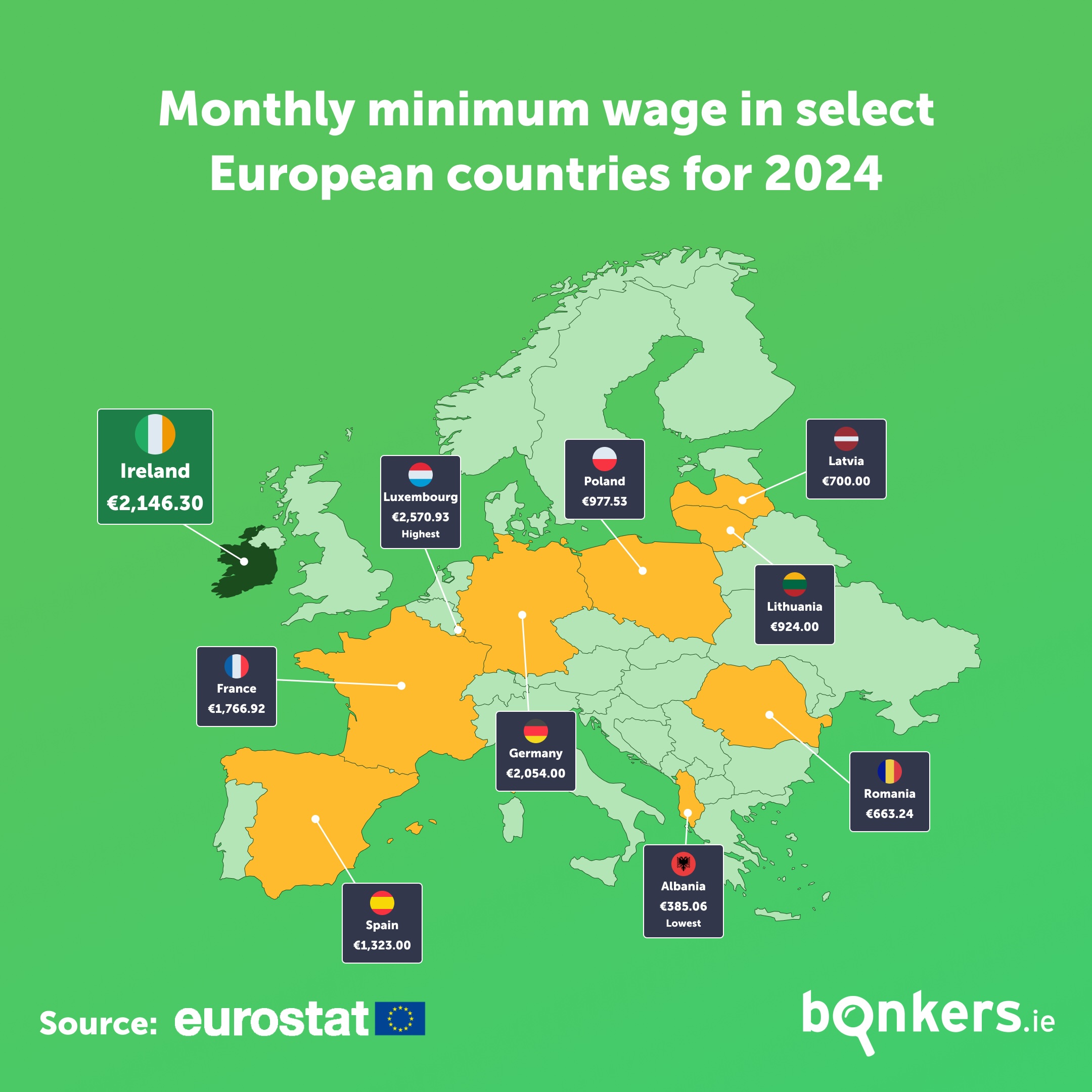Ireland is by no means a cheap place to live. But have you ever wondered why it's so expensive? We decided to investigate.
Tax
They say that only two things are certain in life. Taxes and death. And in Ireland the Government certainly knows how to tax us.
At 23%, our standard rate of VAT is one of the highest in the world and this feeds through into higher consumer prices.
When you buy adult clothes and shoes, perfume, smartphones, computers, TVs, you name it, almost one quarter of the price you pay goes directly to the Government in the form of VAT.
On top of VAT, certain products like cigarettes, petrol, diesel and alcohol also attract excise duty, which is really just another form of tax. And rates here are again among the highest in the world.
For example, over €3 is added to every bottle of wine, almost €7 to every bottle of Champagne or prosecco, and around €8 to every pack of cigarettes in the form of excise duty. And this is even before VAT is included!
Similarly, over 50% (c. €0.90) of the price you pay at the pump for a litre of petrol goes directly to the Government in the form of excise duty, VAT and carbon tax. Meanwhile, Vehicle Registration Tax (VRT) will add thousands to the cost of a new car here. Lovely!
Very often, the difference between what we pay for something here in Ireland and what consumers are charged elsewhere is due entirely to taxation.
|
Country |
Standard VAT Rate |
|
Denmark, Norway, Sweden |
25% |
|
Ireland, Poland |
23% |
|
Belgium, Netherlands, Spain |
21% |
|
Austria, France, United Kingdom |
20% |
|
Cyprus, Germany |
19% |
|
Malta, Turkey |
18% |
|
Luxembourg, Israel |
17% |
|
New Zealand, South Africa |
15% |
|
Australia |
10% |
|
Japan |
8% |
|
Canada |
5% - 15% depending on province |

Location
You don’t need a Master’s in Geography to know that we live on a small island on the edge of the Atlantic. A sea lies between us and our nearest neighbour to the east, while America is the nearest land 4,000km away to our west.
This means that there’s an added transportation cost when we import goods from abroad.
For example most of our gas has to cross the Irish sea through a pipeline from Scotland while everyday products which might be transported throughout Europe by train or lorry, have to make the final journey to Ireland by ferry or plane.
Then when goods finally do arrive on our shores, our low population density and poor transport infrastructure, make getting the products onto shelves more expensive than it otherwise should be.
Lack of natural resources
We have a major lack of natural resources in Ireland meaning a huge amount of what we eat, wear and use has to be imported from abroad.
And as outlined above, our relatively isolated, island location means transporting things into the country is more expensive than other countries.
Being an island on the edge of the Atlantic might be great for our tourism and the scenery but it’s not so great for our pockets!
Consumer inertia
We love to complain about prices in Ireland (in fact we love to complain about lots of things) but we’re not so great at doing anything about it. And consumer inertia almost always leads to higher prices as businesses know they can get away with charging that bit more.
Even after taking into account the differences in business costs and taxes, the foreign multiples like Boots, Tesco and Next routinely charge Irish consumers an extra 5% to 10% simply because they can.
Also, there’s a cultural issue at play here. Most Irish people, if we’re being honest, HATE tightfistedness and almost look down upon people who love to watch every penny. Yet in many other countries it’s considered totally acceptable to haggle, negotiate, and shop around for better value or to gloat about that €3 you saved on razors by paying with your coupon! In Ireland...not so much.
Maybe we’ve more money than sense?
This inertia is also a reason why switching rates in Ireland are quite low. As we always say here at bonkers.ie, switching saves! If you’ve been with your current supplier for over a year or so, the chances are you’re overpaying.
Consumers in other countries are far more likely to shop around and switch to get a better deal than consumers here. So why not join them?
Subsidies
As we explained at the start of this article, Government taxation is a major reason why some things are so expensive in Ireland. However sometimes the opposite - government subsidies - or rather a lack of them, can be the reason.
In many European countries in particular; health care, transport and childcare are all heavily subsided by governments for various social reasons, meaning the cost of a monthly train ticket, GP visit, or a week's creche fees is far lower than it otherwise would be if the 'free market' was setting the price.
Not so in Ireland where the Government pumps less into subsidising public services than other governments do, meaning we pay the among the highest fees for transport, healthcare and childcare in Europe. Which of course makes you wonder just what we're paying all our taxes for...
Size
You don’t need to be an economist to be familiar with the term economies of scale. And as a small country with a population of just over five million people, we simply don’t benefit from the same economies of scale that other countries do.
Many everyday items like groceries and toiletries are cheaper in countries like the UK and Germany because they’ve often been bought in bulk, in quantities 10 or 15 times greater than here.
Of course that’s not to say that every small country in the world is expensive. But in general, the smaller the country, the more expensive it is. And Ireland is small by any standards: we rank a lowly number 125 in the world in the list of countries by population.

Lack of competition
There’s a serious lack of competition in Ireland across many industries. And less competition almost always leads to higher prices for consumers.
From banking, to insurance, to telecommunications and grocery shopping, there are fewer providers supplying Irish customers than in most other countries.
For example, there are three main mobile operators in Ireland (3, Vodafone and Eir) while in the UK there are four (3, Vodafone, EE and O2). There are three main supermarkets here (SuperValu, Dunnes and Tesco) while in the UK there are five (Tesco, Sainsbury’s, Asda, Waitrose and Morrisons). There are now just three main banks here (AIB, BOI, and PTSB) while in the UK there are over ten. It mightn’t seem important, but that one extra competitor or two can often be the difference between cut-throat competition in a sector and a cozy, almost cartel-like behaviour that increases prices for consumers.
Sometimes the lack of competition simply has to do with our size. Smaller countries naturally have fewer suppliers as there are fewer consumers to serve.
However some of it has to do with anti-competitive practices in certain industries that discourage and prohibit new entrants from entering the market and which need to be tackled.
For example, the legal profession has long been touted as an industry that needs radical reform yet the Government has been unwilling to rock the boat, leading to higher professional fees for consumers. Indeed, reducing legal costs was one of the demands of the Troika as part of Ireland’s bailout in 2010 and remains the only demand that has not yet been implemented.
There have also been rumours of cartel-like behaviour in the car insurance sector for some time. Indeed, following a two-year-long investigation the European Commission in 2021 told Insurance Ireland, the representative body for insurance companies here, that it had formed the preliminary view that the organisation had been breaching competition rules and engaging in anti-competitive practices in the car insurance market for some time.
Wages
Almost nobody thinks they get paid enough but high wage countries always equal a high cost of living. And Ireland, by all accounts, is a high wage country. Whether wages here are high enough to support the much higher cost of living is a debate for another day!
The minimum wage in Ireland is €12.70 an hour or over €2,100 a month based on a 39-hour working week. While it might seem low, this is the second highest in the EU after Luxembourg and compares to a minimum wage of less than €500 a month in Bulgaria and even less in some non-EU countries. And the Government has promised to phase in a new 'living wage' over the next few years. The living wage will be set at 60% of the median wage in any given year which, in 2024, would be over €14 an hour.

Claims culture
Over the past two decades or so 'compo culture' in Ireland has gotten insanely out of hand. So much so that we now make the Americans look bad at it.
And it doesn't help that awards for personal injury claims in Irish courts are sometimes multiples of those awarded in other jurisdictions.
While some claims are genuine, many are frivolous at best and outright fraudulent at worst, and this is pushing up the cost of insurance for everyone, to the point where it's unaffordable for some businesses. And in 2019 we reached Peak Compo Culture when news emerged that a then 43-year-old Government TD was suing a hotel for falling off a small swing which she claimed wasn't supervised. Words fail...
The cost of public liability insurance is now a huge overhead for many businesses and this is feeding through into higher prices for everyone.
And although the Government says it remains committed to tackling compo culture and excessive personal liability awards, reform remains slow.
High energy costs
Ireland also has high energy costs, particularly for electricity where our prices are among the highest in the world.
As we use energy to make and provide almost every type of good and service, this feeds through into higher prices for consumers at the tills.
But why are our electricity prices so high? Reasons include our dispersed population, data centres, and our lack of indigenous fuel sources, which you can read more about here.
It you think you're overpaying for your energy, head to our energy comparison service where you can compare prices and switch to a cheaper supplier in minutes. You'll save hundreds!
Get in touch
How do you feel about paying so much for some many things in Ireland? Do you struggle to get by each month? And what do you think the Government should do about it?
Sound off in the comments below!
